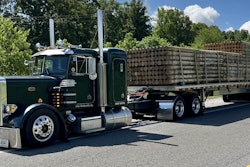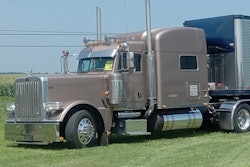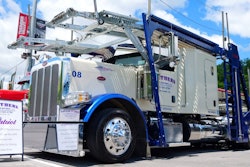Trucking news and briefs for Tuesday, Sept. 9, 2025:
- More autonomous truck testing is under way on I-35 in Texas. Will this major truck maker and its tech partner take drivers out of the cab?
- How spot rates performed during the Labor Day “short week.”
- FMCSA’s latest move to address fraud: no more paper payments.
- Legislation aimed at helping military vets transition to transportation jobs clears another hurdle.
International begins autonomous fleet trials
International Motors on Monday, Sept. 8, announced the launch of customer fleet trials using second-generation autonomous vehicles, in partnership with autonomous truck tech developer PlusAI.
International said it will start piloting its autonomous on-highway tractor along the I-35 corridor between Laredo and Dallas with select fleet operators. The fleet trials will be managed from International's autonomous hub in San Antonio, ensuring close collaboration with customers and a deeper understanding of real-world applications.
Asked whether trials will involve a safety driver in the cab on the public highway, PlusAI didn't respond, yet company Vice President for Public Policy Earl Adams Jr. in June reporting in Overdrive insisted all "driver out" trials of the company's systems were being done on closed courses, not public roads.
[Related: Will owner-operators have to compete with truly 'driverless' fleets?]
The second-generation autonomous system from the company features an updated sensor suite and computer, which has been factory installed on an International LT powered by the S13 Integrated Powertrain and the latest-generation SuperDrive autonomous driving software from Plus.

Trained on real-world driving data, the companies said, SuperDrive is built on "end-to-end AI models" that make it adaptable to new routes, geographies, and driving conditions. A "multimodal sensor kit" combines imaging radar, lidar, and strategically placed cameras around the vehicle.
"This pilot program is a big step toward seamless digital operations that are designed to deliver an exceptional customer experience," said Tobias Glitterstam, International Chief Strategy and Transformation Officer. "By working hand-in-hand with our customers, we are proving the commercial viability of autonomous technologies and providing innovative solutions that improve safety, efficiency, and the bottom line."
With fleet trials underway, International said it’s demonstrating its commitment to continue advancing its autonomous development tractor. The company’s goal is to “transform logistics with factory-installed, autonomous vehicle solutions that seamlessly integrate into real-world freight operations,” a press release noted.
[Related: Driverless-truck tech: Owner-ops worry over cyberattacks, crashes, competition]
FMCSA ending acceptance of paper payments
The Federal Motor Carrier Safety Administration will no longer accept paper payments, such as checks or money orders, for any agency transactions, including fees for initial application of operating authority registration, reinstatement or legal name changes, civil penalty payments, and other fee-based transactions, effective Sept. 30.
FMCSA said it has actively engaged with stakeholders over the past several weeks to ensure broad awareness of this change and to support a smooth transition.
The transition aligns with an Executive Order from President Donald Trump that mandated “the transition to electronic payments for all Federal disbursements and receipts by digitizing payments to the extent permissible under applicable law.” The order said use of paper-based payments “imposes unnecessary costs; delays; and risks of fraud, lost payments, theft, and inefficiencies.”
Beginning Sept. 30, 2025:
- FMCSA will not process paper payments (such as checks and money orders) for any transactions.
- Stakeholders must provide debit or credit card information to make payment.
- For financial responsibility (insurance filing fees), entities should refer to their monthly invoice for instructions.
- For operating authority registration related fees such as initial applications, name changes, and reinstatements, entities should visit the FMCSA registration website.
Any checks received by the agency after the deadline will not be processed and will be returned, potentially delaying services. If submitting a paper application, applicants must complete the credit card information at the bottom of the form before submitting.
[Related: LoadPay digital banking tool: Recent-history evolution, utility for owner-ops]
House passes bill to ease transition of military vets into trucking
A bill introduced earlier this year and cleared by the House Transportation & Infrastructure Committee to strengthen both veteran employment opportunities and the American supply chain workforce has now passed the U.S. House and will move on to the Senate.
The Transitioning Retiring and New Service Members to Port, Ocean, Rail, and Truck (TRANSPORT) Jobs Act directs the Secretary of Transportation to work with other federal agencies to develop and release a plan that will identify:
- Barriers veterans face when searching for employment, during the hiring process, or in training to become supply chain employees
- Challenges supply chain employers face when recruiting, hiring, or retaining veterans
- Regulatory burdens employers face in the hiring of supply chain employees, especially for veterans
- Regions of the United States which have the greatest workforce need for supply chain employees
- Barriers and industry trends that directly or indirectly discourage veterans from pursuing, attaining, and remaining in supply chain careers
The plan should also highlight the specific knowledge, skills and abilities veterans possess that are critical for supply chain careers and any competency gaps that should be addressed. Likewise: opportunities to expand or enhance existing initiatives for veterans to become supply chain employees and ways to improve supply chain employer outreach programs and enhance existing training, mentorship, education, and advancement programs that would increase the participation and engagement of veterans in the supply chain workforce.
Finally, the plan should, in consultation with transportation industry stakeholders, recommend specific short- and long-term actions the DOT, the Department of Defense, the Department of Veterans Affairs, or the Department of Labor can take to help veterans become supply chain employees.
"No one is better trained or more mission-focused than our veterans, yet too many are left struggling to find meaningful employment after leaving the military," bill sponsor Rep. Tom Barrett (R-Michigan) said when he introduced the bill. "It’s time we tear down the roadblocks that stand between those who served and the jobs that need doing in our economy. The TRANSPORT Jobs Act is a critical first step in that process and achieves two goals at once -- supporting our veterans and strengthening our nation’s supply chain."
[Related: House committee clears bill to help veterans transition to transportation jobs]










